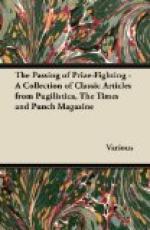The treaty of the four powers, to which Chelsea, Battersea, Brompton, and Wandsworth are parties, and from which Pimlico has hitherto obstinately stood aloof, has at length been ratified by the re-entry of that impetuous suburb into the general views of Middlesex. We have now a right to call upon Pimlico to disarm, and to cut off its extra watchman with a promptitude that shall show the sincerity with which it has joined the neighbouring powers in the celebrated treaty of Kensington. It is already known that, by this document, Moses Hayley is recognised as hereditary beadle, and Abraham Parker is placed in undisturbed possession of the post of waterman on the coach-stand in the outskirts. We are not among those who expect to find a spirit of propagandism prevailing in the policy of the powers of Pimlico. The lamplighter who lights the district is a man of sound discernment, and there is everything to hope from the moderation he has always exhibited.
* * * * *
SIBTHORP ON THE CORN LAW.
Sibthorp came out in full fig at Sir Robert Peel’s dinner. While he was having his hair curled, and the irons were heating, he asked the two-penny operator what was his opinion of the corn-law question. The barber’s answer suggested the following con.:—
“Why am I like a man eating a particular sort of fancy bread?”—“Because,” answered the tonsor, “you are having
[Illustration: A TWOPENNY TWIST”]
This reply made the Colonel’s hair stand on end, taking it quite out of curl.
* * * * *
FISH SAUCE.
The boy Jones, in one of his visits to the Palace, to avoid detection, secreted himself up the kitchen chimney. The intense heat necessary for the preparation of a large dish of white-bait for her Majesty’s dinner compelled him to relax his hold, and in an instant he was precipitated among the Blackwall delicacies. The indignant cook immediately demanded “his business there.” “Don’t you see,” observed the younker, “I’m
[Illustration: ONE OF THE FRY?”]
* * * * *
PUNCH’S INFORMATION FOR THE PEOPLE.
NO. 4.
NATURAL HISTORY.
Definition.—The history of “naturals”—which chiefly include the human species—and of “simples” (herbs), occupies the branch of science we are about to enlighten our readers upon. It treats, in fact, of animated nature; while physical history—instead of being the history of Apothecaries’ Hall, as many suppose—deals exclusively with inanimate matter.




